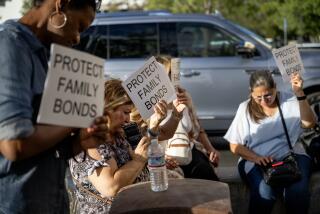Proof That We Are One
- Share via
As we listened to the reports of the landmark findings of the human genome scientists, we heard discussions of the medical and scientific benefits, the legal ramifications and the future uses and abuses. I have already experienced the cultural and human benefits.
I first started following the human genome story in the spring of last year, when I read that geneticists traced the DNA of the black people of southern Africa to Cohanim, Jewish priests believed to be descended from Moses’ older brother, Aaron. The Lemba people--black priests--had folklore that maintained that their ancient ancestors were Jews. The DNA supported the folklore.
I wondered if my nine years of folk-story research tracing family nicknames and funny-sounding words for child-rearing, household items, food, farming and romance between men and women could be backed up by DNA research. I used genealogy and the funny-sounding words and names that made us giggle to trace my family to a specific people, in specific towns, in West Africa.
I was raised in New York in an African American family from the island of Jamaica in the Caribbean. I traced from the present generation back in time, 360 years to specific families who were farmers in the Akuapim Hills, overlooking the Ghana coast--through the Americas, through slavery rebellions, through Africa. My great-grandmothers, nicknamed, “Nunus” and “Mmeme,” nicknamed my father “Pari.” My grandmother nicknamed me “Little Miss Par,” after my father. My mother’s nickname is “Dockyi.”
With these tidbits, I did genealogical research, tracing my family’s surnames and nicknames. I traced my family to 1699 in the Americas to the hills of Jamaica; to 1680 on my mother’s side to the Highlands of Scotland, and to 1640 to the farming hills of Ghana in West Africa.
For years, I collected and learned every nickname in my family, and after college, I researched the names and words formally. When I spoke with an African anthropologist-linguist at the Smithsonian Institution, he laughed and said, “Your family’s nicknames and those words such as ‘chaka-chaka’ (to make messy), ‘nyam’ (to eat too fast), ‘pum-pum’ (the best yam; also a woman’s private parts), are from the Akan people’s language, Twi.”
Specifically, my father’s nickname is from the Akuapim group of the Akan people whose family surname is Opare. I searched all the Ghanaian people on the East Coast of the U.S. and met Opares and other people from the Akuapim Hills.
So, last year, when I read about the geneticists tracing the Lemba people to their ancient ancestors, I contacted Michael Hammer and his team members of the Human Genome Diversity Project. The members of this project announced on Monday that they have identified and sequenced 99% of the genes in humans. Hammer tested my father’s Y-chromosome DNA and compared it to the DNA I collected from 30 of the families from Akuapim in Ghana, Africa.
There was a match. My African American family’s DNA is consistent with that of the people from Ghana. From there, I followed the anthropological and archaeological trail and traced my African American family to the origins of humans in Africa.
On Monday, the geneticists announced, at the genetic level, we are all one race: human. My geneticists already had told me that my direct ancestors are from Africa, and my ancient ancestors are all of the human race.






